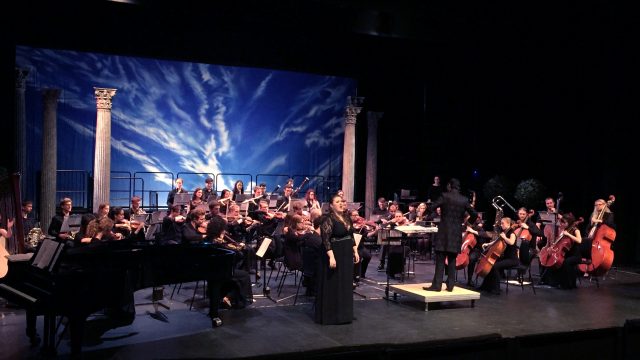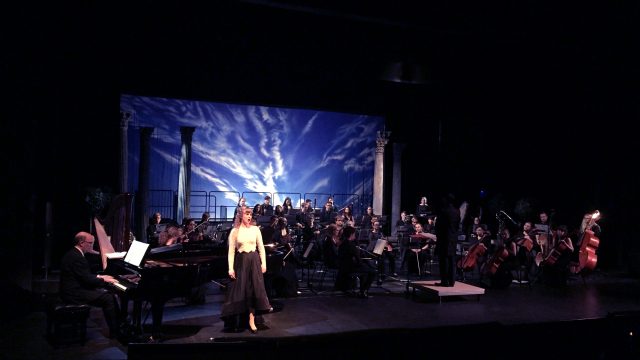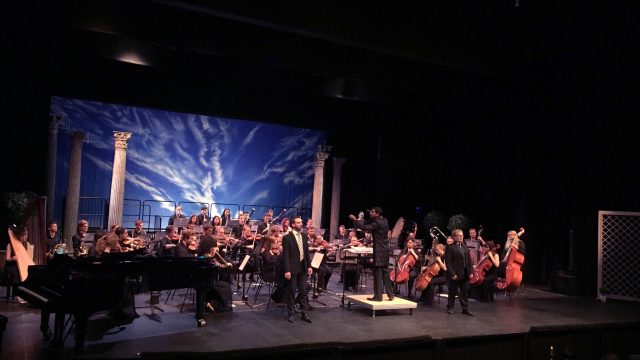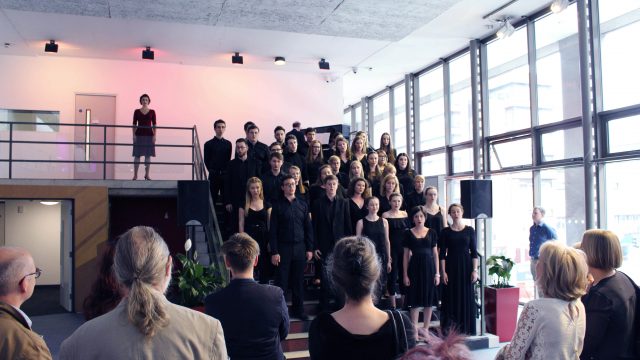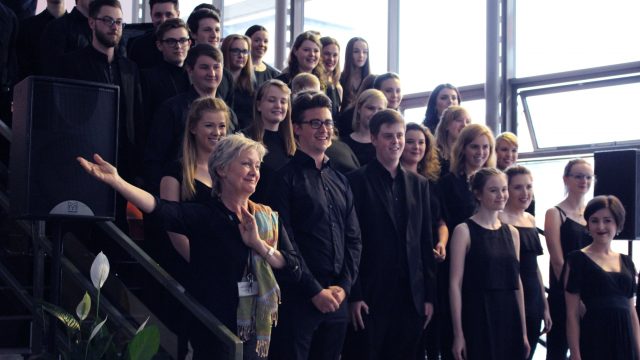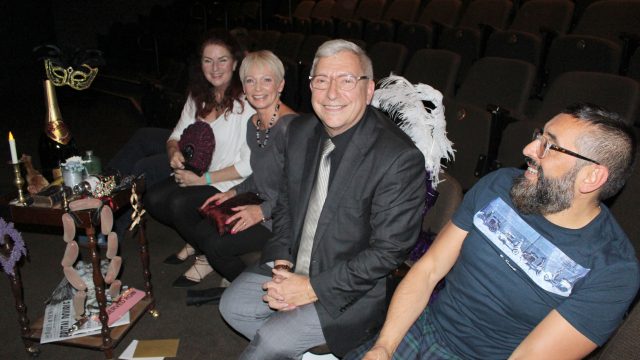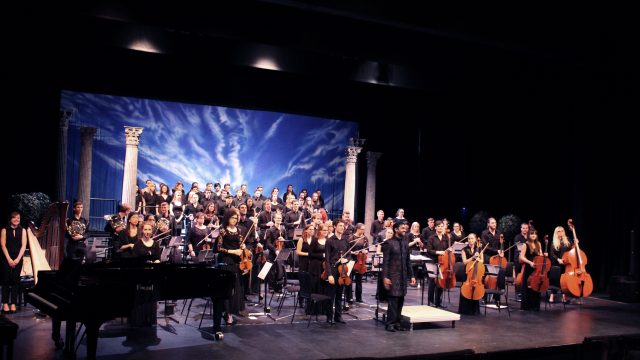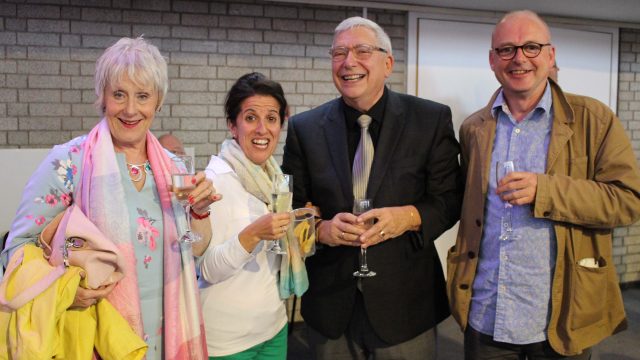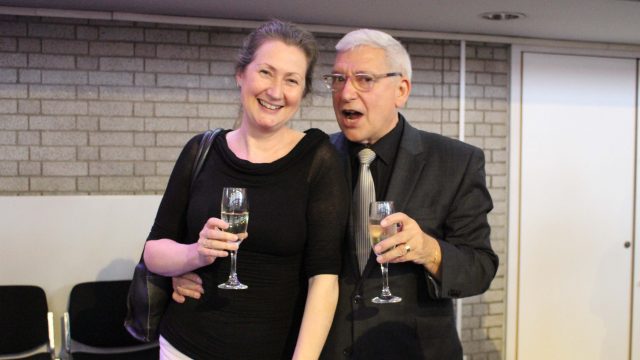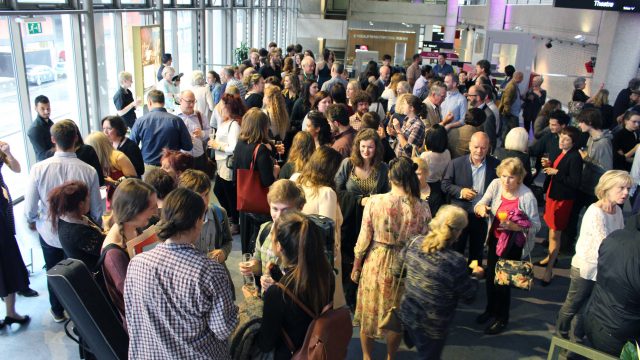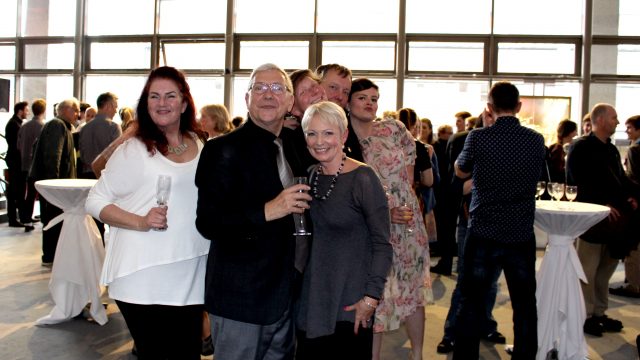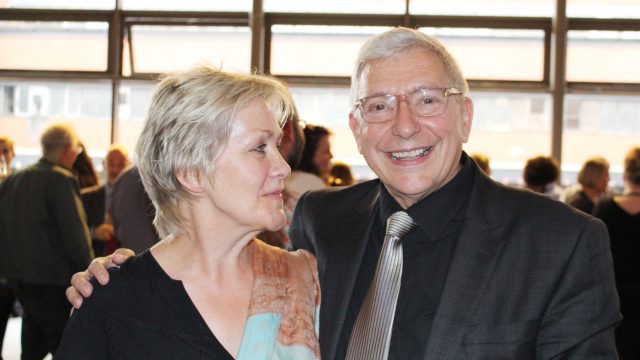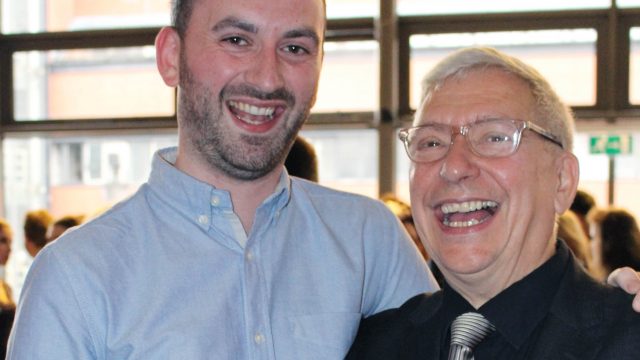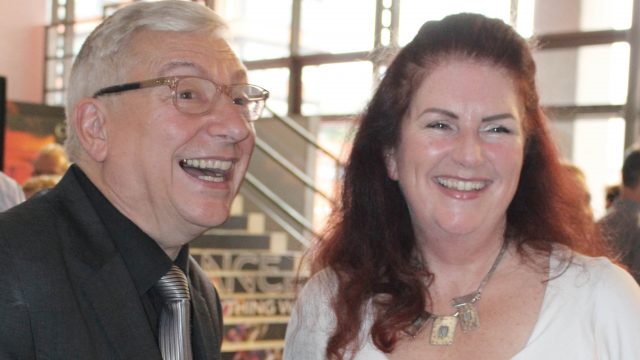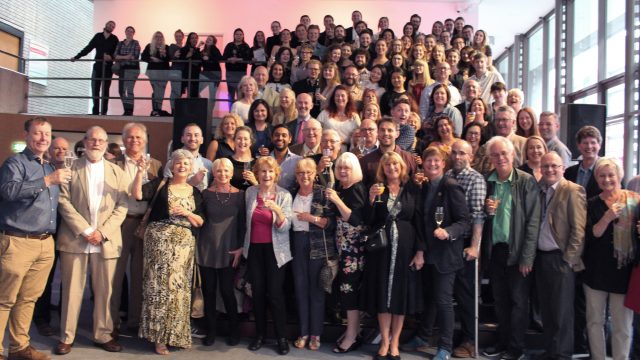Stefan Janski: Exit Stage Left
On Tuesday 28 June the RNCM bid a fond farewell to its fabulous Head of Opera, Stefan Janski, after 30 years. The occasion was celebrated with a concert of his favourite arias in the company of friends, colleagues and students in the RNCM Theatre.
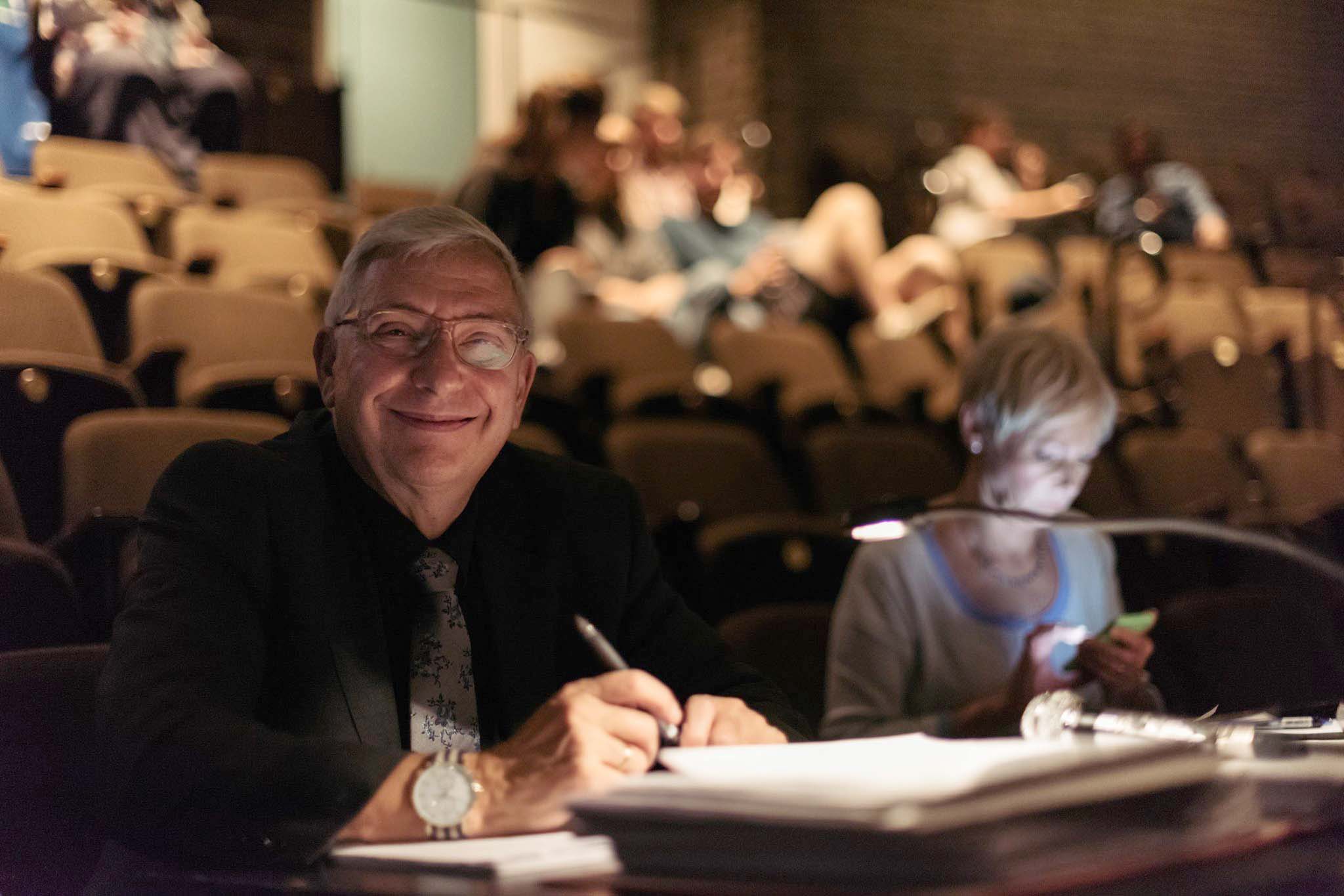
The programme began with a surprise performance on the concourse from the RNCM Chorus, jubilantly singing Shostakovich’s ‘Song About Cheryomushki’ from Paradise Moscow, which Stefan directed at the College in 2013.
This was followed by a concert in the RNCM Theatre featuring the RNCM Chamber Orchestra, Chorus and soloists, conducted by Harish Shankar. The celebration included many of Stefan’s favourite pieces, such as Puccini’s ‘Un bel di’ from Madama Butterfly, Mozart’s ‘La ci darem la mano’ from Don Giovanni and ‘Tatyana’s Letter Scene’ from Eugene Onegin. See the full concert programme here.
Photo Gallery
A Tribute to Stefan
In December, music critic Robert Beale talked to the man who has given so much to the College over the past three decades, ensuring that it remains at the forefront of vocal and operatic training. Here’s what he had to say:
Stefan Janski retires as RNCM Head of Opera this summer after 30 years’ service to the college, and December’s Street Scene was the last full-length production he directed in that capacity – the last of more than 40, at my count.
There have been almost innumerable – at least 700 Opera Scenes (the fully-staged excerpts in which RNCM singers perform a vast range of the repertory in public) and many other special events and occasions on which his expertise as stage director and drama coach has been called upon.
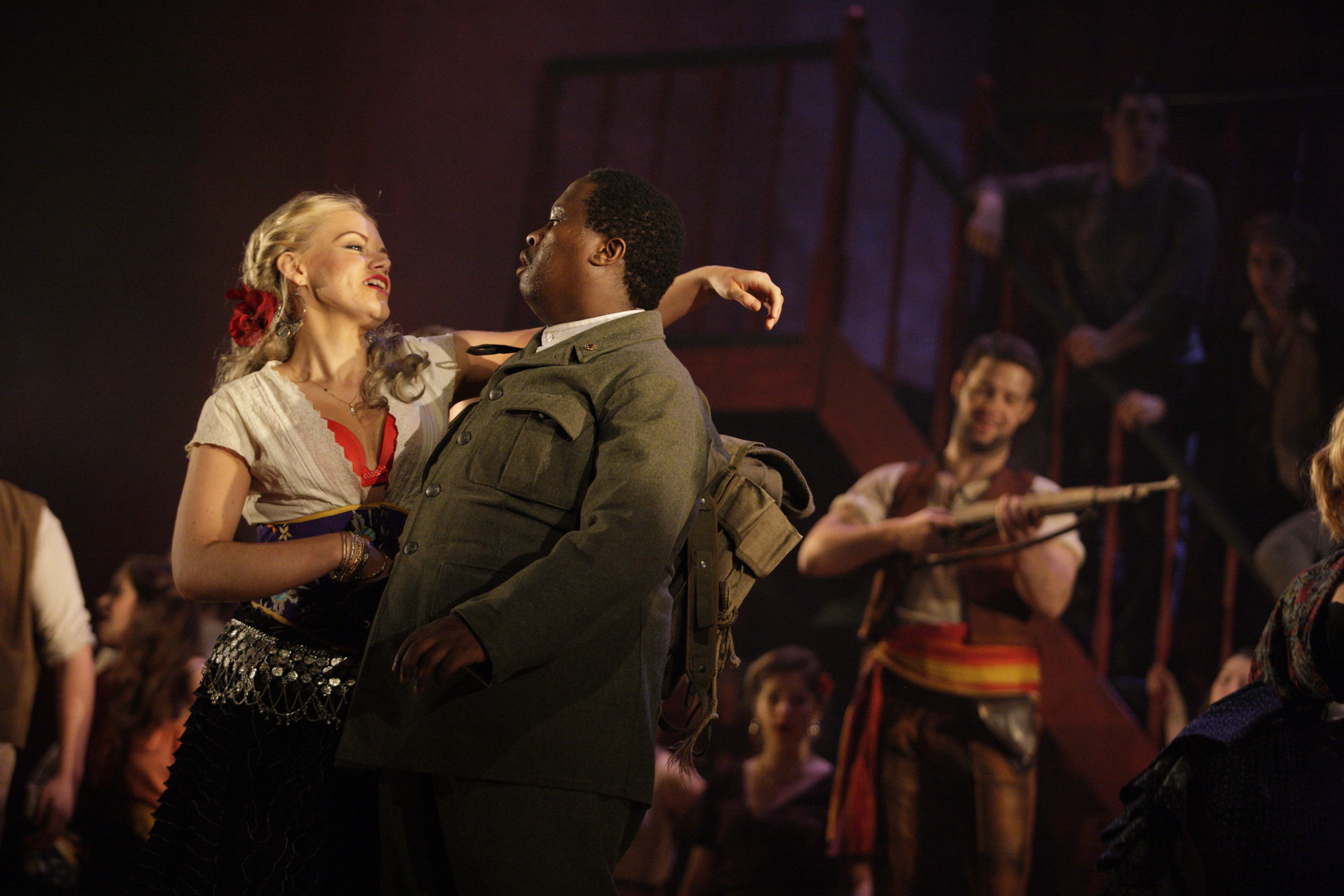
Carmen, 2010
Stefan is the only British music conservatoire opera chief to be a director, not a conductor – a difference which is allied with the RNCM’s (and his) policy of opening up opera productions not just to a small number of postgraduate specialists but undergraduates too. He’s also had – and still has – a long and varied career as director outside the college, in a life in the theatre that goes right back to childhood days.
‘I was brought up in the Islington slums,’ he recalls. ‘We were a very poor family, and we never had a television until we moved to Tottenham when I was nine and rented one so we could watch Princess Margaret’s wedding (in 1960). So I was a child of the radio, and at school I was enthused by play readings and poetry. I also learned the clarinet and wanted to be another Acker Bilk, but that didn’t happen.’
He went to Tottenham County Grammar School and at 15 was set for a career in catering and hotel management, using silver service skills his grandma taught him. He worked as a waiter on the Isle of Wight – ‘I loved the dressing up in DJ!’ – and still enjoys time in the kitchen at home.
But theatre beckoned. He’d joined Mountview Theatre Club in Muswell Hill, where one of the staff suggested he audition for stage school. With a grant from Tottenham Council he was able to join the New College of Speech and Drama (‘It was then in Anna Pavlova’s former house, opposite the Bull and Bush in North Hampstead’), taught mainly by former staff of the Royal Academy of Music speech and drama department.
‘I was going to be an actor and teacher – but I found I enjoyed the rehearsal process more than the performing. And I got my first taste of directing …’
One of his teachers was a music adviser for Sadler’s Wells Opera – now English National Opera, running children’s opera workshops, and Stefan joined in projects including Malcolm Williamson’s The Moonrakers and the première of John Paynter’s The Space Dragon of Galata. ‘We used to create an operatic experience for 100 children, rehearsing and staging a performance in three hours – and then we’d tell them what Sadler’s Wells was coming to perform near them.’ He was co-producer and librettist and his The Snowman of Kashmir was published by Universal Edition in 1974.
He also qualified as a teacher and was head of drama at schools in Greenwich and then Croydon. ‘My career was going quite well – but I still had the link with Sadler’s Wells, helping to coach child performers. In rehearsals for Carmen, The Magic Flute and Madama Butterfly, I saw directors like John Copley and Anthony Besch in action, and I thought: ‘I could do that …’.’
‘I was a child of the radio, and at school I was enthused by play readings and poetry. I also learned the clarinet and wanted to be another Acker Bilk, but that didn’t happen…’
The opportunities began to come. He joined the education group Curtain Theatre as actor, teacher and musician, and in 1979 was assistant to John Cox at Glyndebourne for Strauss’s Die schweigsame Frau, becoming associate director with Glyndebourne Festival and Touring Opera for four seasons.
He joined English National Opera as a staff producer, working with Colin Graham (‘I learned about crowd scenes from him’), John Copley (‘he taught me about frocks and humour’), Anthony Besch (‘pernicketiness’ from him), Sir Peter Hall (‘suspended time’) and Jonathan Miller (‘detail and psychology’ from him).
So teaching came to an end and he was a freelance director for several years, working with ENO, Glyndebourne, New Sussex Opera, Scottish Opera, the Wexford and Cheltenham Festivals, as well as the National Opera Studio, Royal Academy of Music, Mountview Theatre School and elsewhere.
He was on his way to Scotland when he first called at the RNCM, to deliver his nomination for its Tim Brandt Trust Award for opera direction – which he was given – and was then invited to audition and to direct opera excerpts at the College. ‘I couldn’t actually do that, because it clashed with the diva Maria Ewing who beckoned as Rosina in Il Barbiere di Siviglia dress rehearsal at Glyndebourne, but in 1986 they needed a temporary replacement for Malcolm Fraser, the College’s then teacher of drama (and founder of the Buxton Opera Festival), who was away in the USA.
‘I got the phone call and thought ‘Manchester – that’s hours away from where I live!’ But I applied, was asked to do it, and lived at Hartley Hall (the then RNCM residential centre) for six months, Monday to Friday.
‘In 1987 Malcolm took a permanent job in Cincinnati, and I joined the full-time staff here.’ There have been countless RNCM Opera Scenes under Stefan’s direction since then (his final ones will be in January and June 2016), his full-length productions year by year (nominated for the Manchester Theatre Awards more than 16 times), plus other special events – and he has directed elsewhere with extraordinary energy.
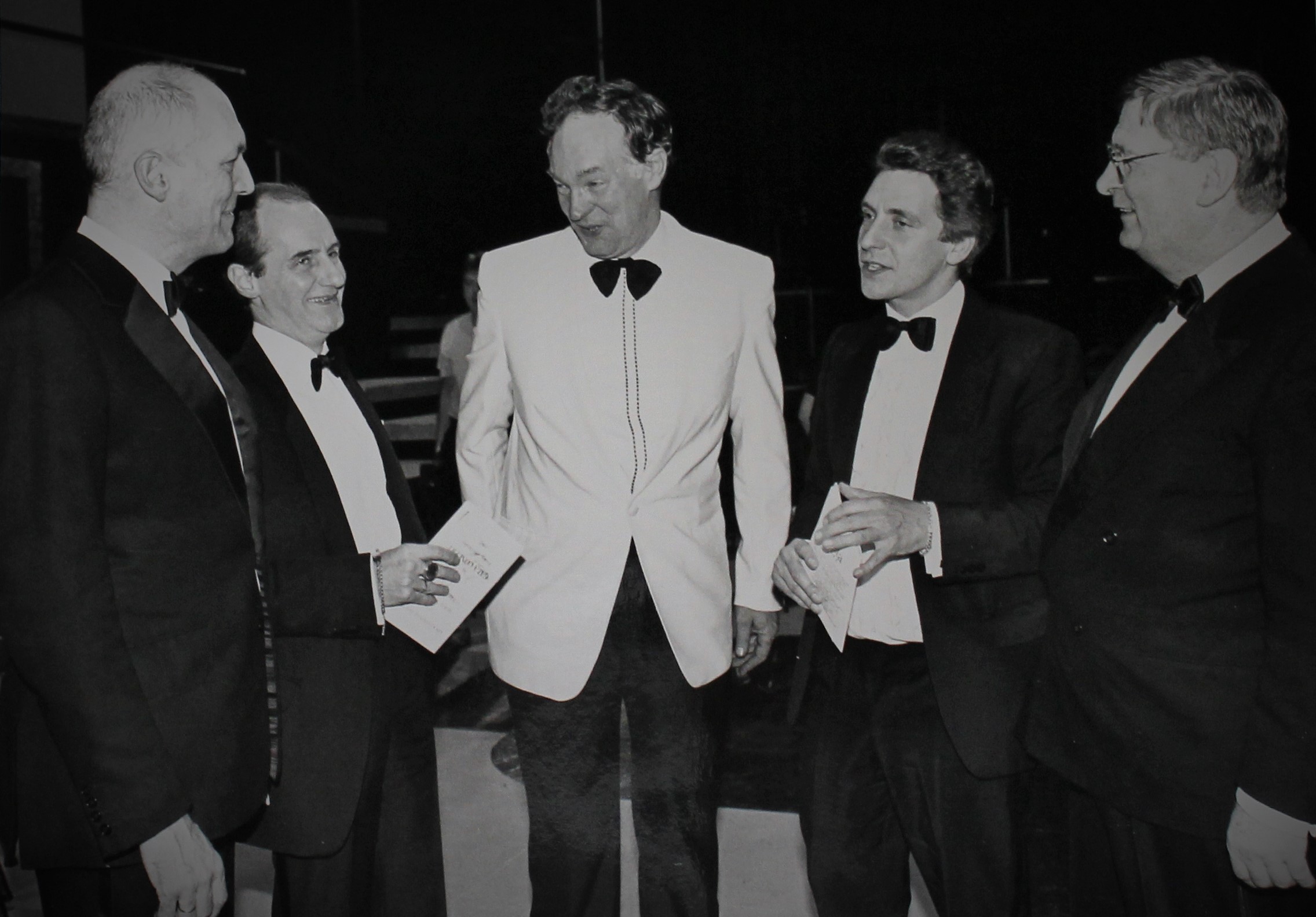
Stefan pictured with colleagues in 1992
His first production (Menotti’s The Consul) included Amanda Roocroft in its cast, and he has seen a succession of great singers blossom and develop at the college over 30 years. He’s turned his hand to the skills of community theatre direction and early music productions, introduced microphone technique and put on musicals to prepare performers for the modern theatre, and seen the introduction of surtitles and of the International Artist Diploma/RNCM Opera Studio for experienced postgraduate singers. There is now a formal link with Opera North, a collaborative chorus mentor scheme and also a growing collaboration with Manchester Metropolitan University’s theatre department.
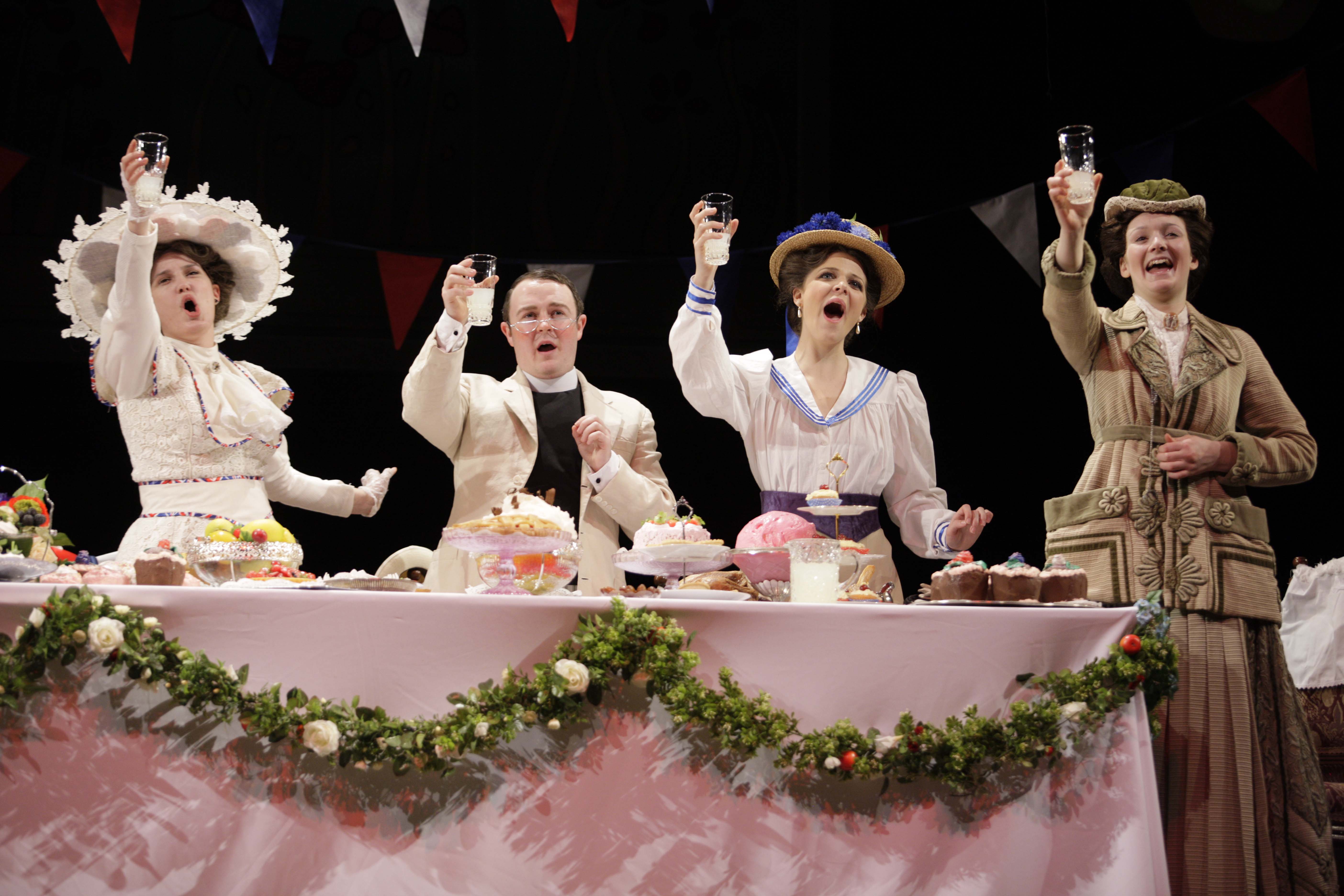
Albert Herring, 2011
For the RNCM he has directed Don Carlo, The Rape of Lucretia, Falstaff, From the House of the Dead, La bohème, The Magic Flute, Don Giovanni, Into the Woods, Orleanskya Dyeva, Jenůfa, Albert Herring, The Lighthouse, La Cenerentola, La Rondine, The Threepenny Opera, The Cunning Little Vixen, Eugene Onegin, The Marriage of Figaro, L’heure Espagnol and L’enfant et les sortilèges, Die Fledermaus, Katya Kabanova, Candide, La belle Hélène, La Clemenza di Tito, Carmen, Albert Herring, Serse, Il ritorno d’Ulisse in patria, Paradise Moscow, L’elisir d’amore, Gluck’s The Drunkard Cured and Orfeo ed Euridice, and The Merry Widow, among others.
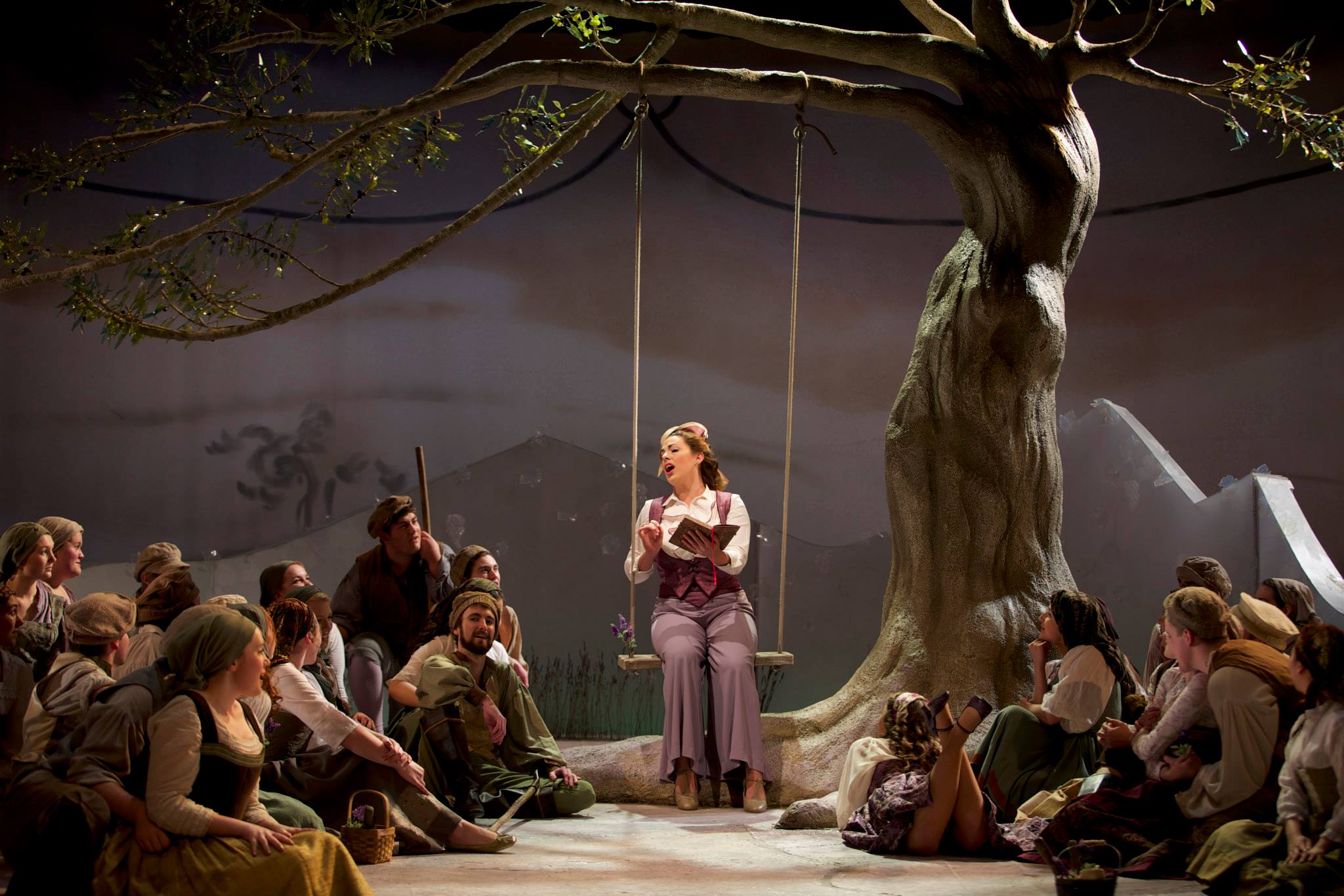
L’elisir d’amore, 2013
It’s unfair to ask him to name a best production of all his time here, or even a ‘best of’ selection … but I think we share a favourite in his magical staging of La bohème in 1997. Stefan is renowned for his crowd scenes, with all available hands – including administrative staff, sometimes – on stage. For this the now international tenor Hugh Francis learnt to stilt walk for his role as Parpignol, and since there were children among those on stage, performers costumed as gendarmes really had to function as policemen to keep everyone else under control!
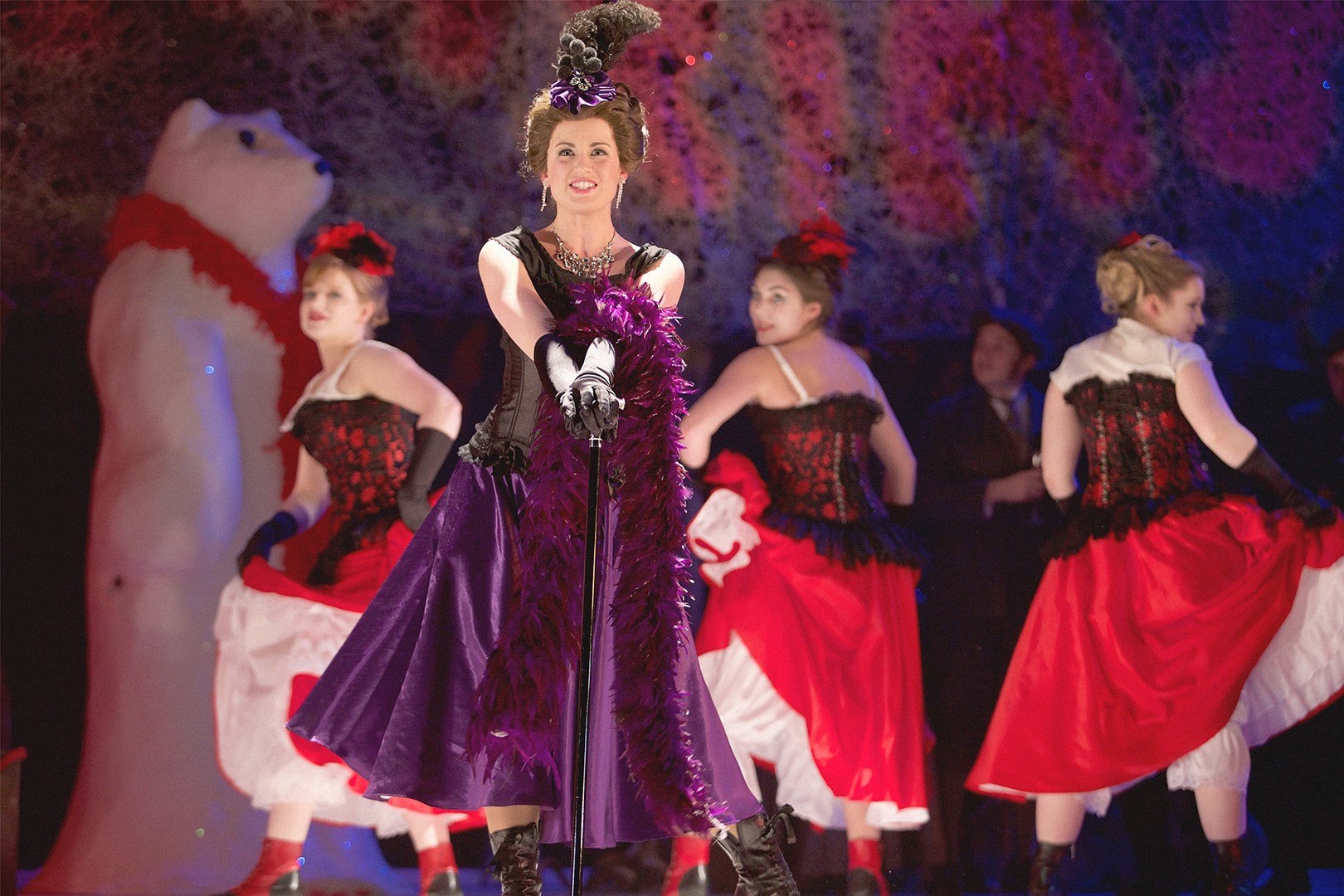
The Merry Widow, 2014
Elsewhere, Stefan’s work includes productions for Northern Ireland Opera Trust, Brighton Festival, Lake District Summer Music, Oxford and London Universities, Nantes Opera, British Youth Opera, the Barbican, City of London Opera, Los Angeles Opera, the BBC Philharmonic, Melbourne, Aix-en-Musique, the Mananan Festival, the Ryedale Festival, Uzerche Festival, Royal Ballet of Flanders and the Royal Academy of Dramatic Art.
‘I’m a Mancunian now. I care about the students and the legacy of this place. I don’t know what the future holds, but I do want to be part of it. It’s a real centre of excellence – and I hope will always stay that way.’ – Stefan Janski
29 June 2016

